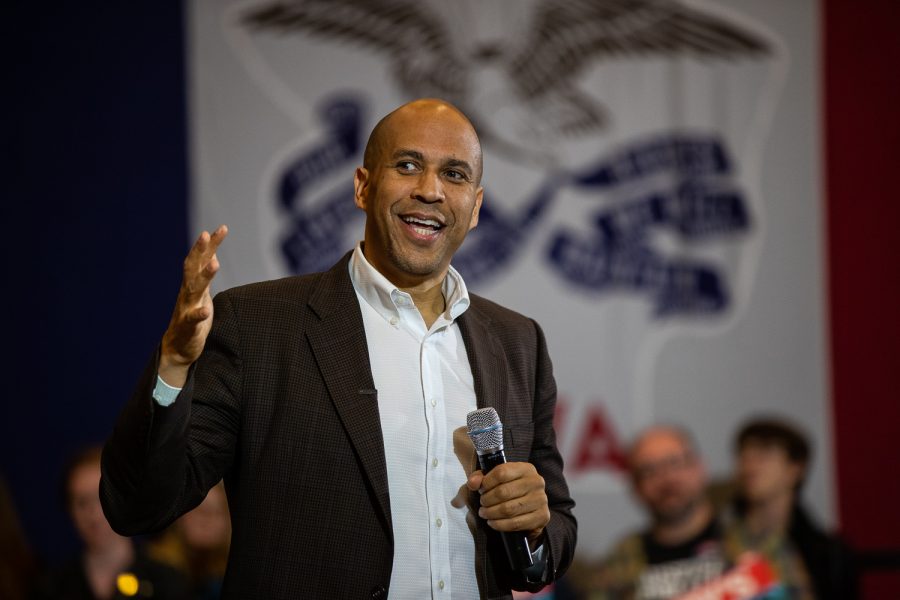Cory Booker releases plan to pay college athletes
In a press release Thursday, presidential hopeful Cory Booker detailed how he would address “exploitative labor practices” in the sporting industry, with an eye toward college sports.
Senator Cory Booker, D-NJ, speaks to an audience during a forum at the Iowa Memorial Union on Monday, October 7, 2019.
October 11, 2019
Democratic presidential hopeful Cory Booker announced a plan Thursday to allow collegiate athletes to be paid and “end exploitation in sports.”
The New Jersey senator’s proposition is directed at athletes at all levels but focuses heavily on college sports. A former Division I football player himself, Booker said in a press release he saw firsthand the injustices present in college sports.
“Playing football at Stanford was one of the greatest opportunities I have ever received. What I learned about hard work, perseverance, and teamwork are lessons I carry with me to this day,” Booker said in the press release. “I also learned that fair play means recognizing injustice everywhere — including unfair practices that have gone on for far too long in college and professional sports.”
The plan takes aim at the NCAA, calling the organization’s amateurism rules that prevent players from being paid exploitative and unjust. Under current NCAA rules, college athletes are barred from receiving compensation from any activity related to their role as an athlete.
On Sept. 30, California passed a law that challenges the NCAA rules, allowing college athletes to accept sponsorships and hire agents. Building on the legislation in California, Booker said he would push for legislation that would allow college athletes to be compensated for their “name, image, and likeness.”
“The systemic problems in sports are issues of economic justice and fairness,” Booker said in the press release. “For too long, we have allowed exploitative practices in professional and college sports to fester.”
The plan aims to address college athletes’ health, requiring colleges to comply with stricter health and wellness standards. The release cites deaths of college football players and CTE in former college football players as justification for enforcing standards in college sports.
Additionally, Booker wants to ensure that current and former NCAA players get medical expenses paid for injuries sustained while participating in sports. Colleges would be required to cover those expenses for up to 10 years after an athlete’s eligibility ends.
The plan also details increasing gender equity in college sports by strengthening requirements for schools to be compliant with Title IX, requiring that spending on athletics and scholarships be more in line with a college’s male-female student ratio.
J.D. Scholten, a Democratic candidate for Iowa’s 4th Congressional District, signaled his support for Booker’s proposal in a tweet on Thursday. Scholten, a former college athlete and minor league baseball player, said he appreciated Booker bringing attention to the issues.
As a former collegiate athlete, minor league baseball player and an advocate for social and economic justice, I appreciate @CoryBooker shining light on these issues. https://t.co/1NO0SsyDiO
— J.D. Scholten (@JDScholten) October 10, 2019
Booker’s plan also pushes for gender equity in professional sports, addressing the gap between the earnings of male and female players. Booker plans to create a “Federal commission for justice and integrity in sports” which would conduct studies across amateur, professional, and Olympic sporting organizations to ensure that athletes get fair wages and have the ability to organize into unions.
In March, the U.S. Women’s soccer team sued the United States Soccer Federation over alleged gender discrimination, claiming the organization paid the women’s team less than the men’s while requiring them to play more games.
To enforce wage fairness, Booker would sign the Athletics Fair Pay Act, a 2019 bill that would require US sports governing bodies to compensate female athletes fairly in order to keep their status. The act would put the burden on the organizations and not require any federal funding, Booker’s deputy policy director Chad Maisel told reporters in a conference call Friday.
Maisel said the pay disparity is reflective of broader social problems that Cory hopes to address as well. Booker is a cosponsor of the senate Paycheck Fairness Act, a bill that would strengthen laws around wage disparity across all industries.
“These are issues we’re seeing in sports, but they persist across our entire economy and our entire labor market,” he said.



